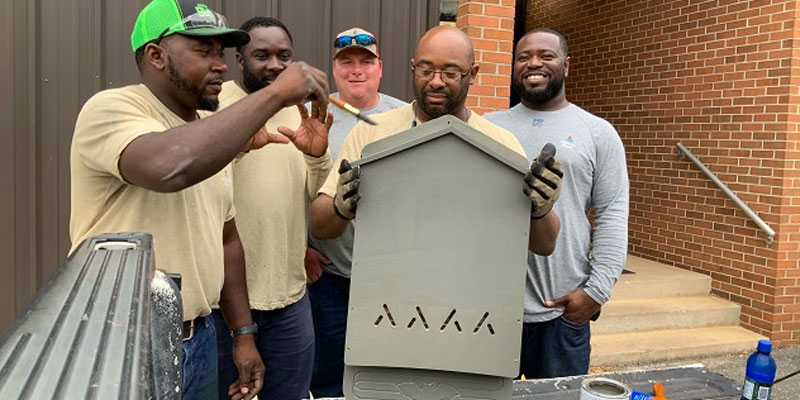Bats across the state of Alabama will soon have new digs thanks to Alabama Power Service Organization (APSO) volunteers.
APSO chapters spent part of last week building and painting bat houses that will be installed in wooded areas. Some will also go up near Alabama Power lakes and rivers. The work was part of Southern Company’s Week of Service.
“We put them together and painted them and are going to decorate them,” said Tammy Reece, with the Magic City APSO chapter and executive secretary in Environmental Affairs. “Some will go to a Girl Scouts troop for them to install and some will go to our reservoirs and walking trails, and some will go to backyards and homes.”
Alabama Power volunteers build bat houses to help protect state’s bats from Alabama NewsCenter on Vimeo.
APSO volunteers built more than 50 bat houses, learning about bats and their habitats in the process.
“This was a very interesting and fun project to volunteer with and everyone learned a lot about bats, too,” said Brooke Goff, a community relations specialist in the Southeast Division.
The project is one of several ways Alabama Power works to protect bats and their habitats, including support of the “Bats to the Future Fund.”
The fund works to combat white-nose syndrome, a fungus that has led to significant bat population loss.
While there is no cure yet, research is being done for treatment and prevention through the fund, established by the nonprofit National Fish and Wildlife Foundation. Southern Company, Alabama Power’s parent company, is among the supporters of the fund.
The Bats for the Future Fund has awarded 10 grants in its first two years, totaling 2.5 million. The next round of grants will be announced in January 2020.
Alabama Power also supports the annual Bat Blitz, when biologists, researchers and bat lovers across the Southeast converge to survey Alabama bat populations and check for white-nose syndrome.
Bats are voracious bug eaters and serve as natural controls on insect populations. Their eating habits help reduce insect damage to forests and crops, and in some parts of the world bats are important plant pollinators.
There are 15 bat species in Alabama. Three species – the gray bat, the Indiana bat and the northern long-eared bat – are protected under the federal Endangered Species Act.
(Courtesy of Alabama NewsCenter)













